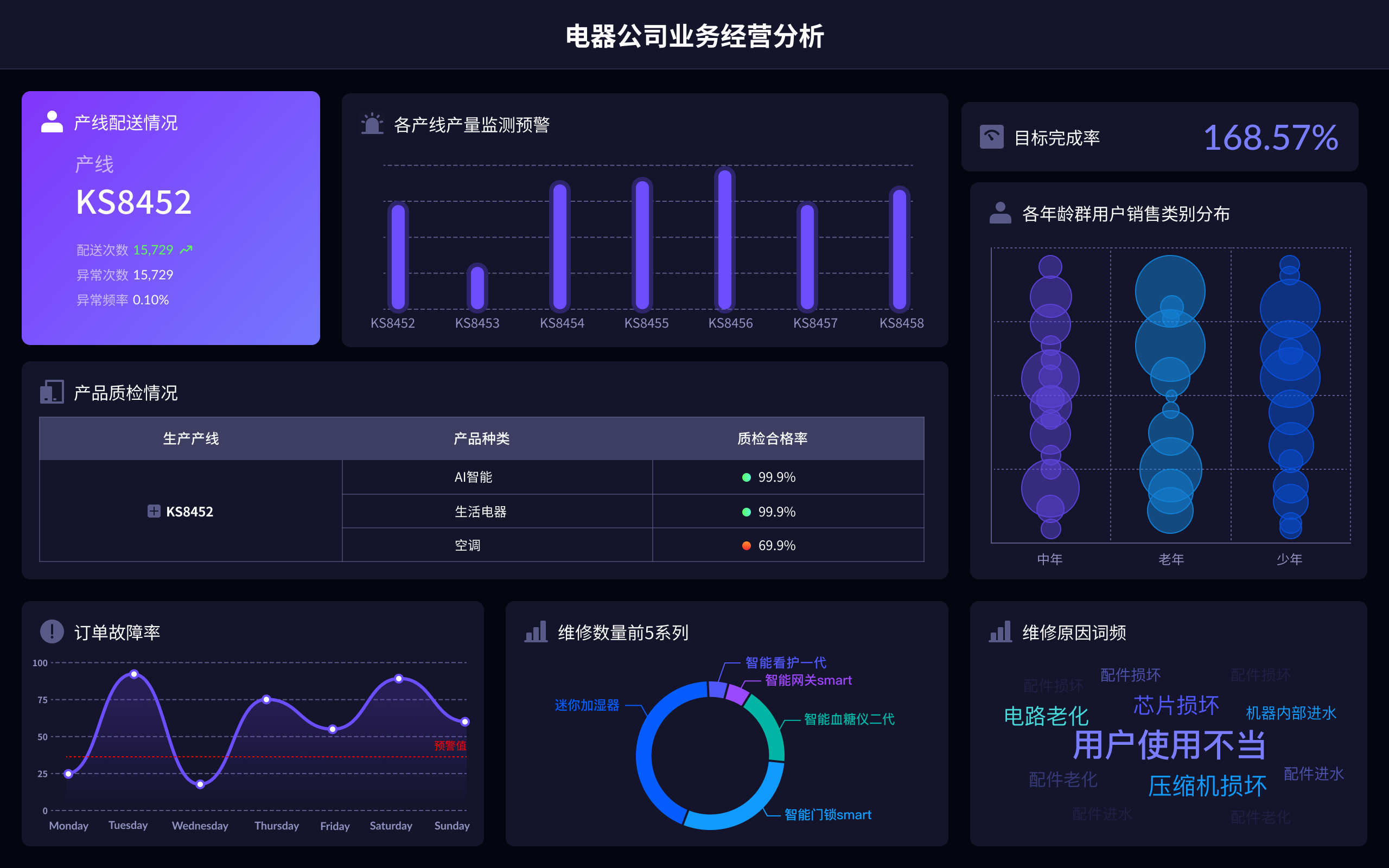
数据库在现代社会中非常重要,原因有很多:数据存储和管理、数据安全性、数据分析和决策支持、提高业务效率。在现代社会,数据是企业和组织最宝贵的资产之一。数据库允许企业安全、高效地存储和管理大量数据,这对于日常运营和长期战略规划至关重要。数据分析和决策支持尤其关键,通过数据库存储和管理数据,企业能够快速、准确地进行数据分析,进而做出更明智的商业决策。例如,电子商务平台通过分析用户购买数据,可以更好地了解客户需求,优化产品推荐,从而提高销售额。数据库的重要性不仅体现在商业领域,还广泛应用于医疗、教育、政府等多个行业。
一、数据存储和管理
数据库技术使得大量数据的存储和管理变得高效和可靠。与传统的文件系统相比,数据库提供了结构化的存储方式,可以方便地对数据进行添加、删除、修改和查询。这种高效的管理方式不仅节省了存储空间,还提高了数据检索的速度和准确性。通过数据库,企业可以轻松管理客户信息、库存数据、财务记录等各种类型的数据,从而为业务运营提供坚实的基础。此外,数据库还支持并发访问,允许多个用户同时进行数据操作,这对于大型企业和组织尤为重要。
二、数据安全性
数据安全性是数据库技术的一个关键优势。数据库系统通常具备强大的安全功能,包括用户身份验证、权限控制、加密等,确保只有授权用户才能访问和操作敏感数据。这种安全机制有效防止了数据泄露和未经授权的访问,保护了企业的核心资产。通过定期的备份和恢复机制,数据库还可以在数据丢失或系统故障时迅速恢复,确保业务的连续性。例如,在金融行业,数据库技术用于保护客户的个人信息和交易记录,确保数据的完整性和机密性,减少欺诈风险。
三、数据分析和决策支持
数据库不仅是数据存储的工具,更是数据分析和决策支持的利器。通过数据库,企业可以快速、准确地进行数据分析,挖掘出隐藏在数据中的商业价值。数据库系统支持复杂的查询和统计功能,帮助企业从海量数据中提取有价值的信息。例如,零售企业可以通过数据库分析销售数据,了解哪些产品最受欢迎、哪些时段销售最火爆,从而调整库存和营销策略。此外,数据库还支持数据挖掘和机器学习,为企业提供智能化的决策支持。这种基于数据的决策不仅提高了企业的竞争力,还降低了决策风险。
四、提高业务效率
通过使用数据库技术,企业可以大幅提高业务效率。数据库系统提供了自动化的数据处理和管理功能,减少了人工操作和人为错误。例如,企业可以通过数据库自动生成报表,实时监控业务运行情况,快速发现并解决问题。数据库还支持工作流管理和业务流程自动化,优化了企业的运营流程。例如,物流公司通过数据库系统管理运输和配送,实时跟踪货物的位置和状态,提高了配送效率和客户满意度。数据库技术的应用不仅节省了企业的运营成本,还提升了客户服务质量,增强了市场竞争力。
五、跨平台和跨地域的数据共享
数据库技术支持跨平台和跨地域的数据共享,促进了全球化业务的发展。在现代商业环境中,企业的业务往往遍布全球,数据需要在不同的系统和地域之间流转。数据库提供了标准化的数据接口和协议,支持不同平台和系统之间的数据交换。例如,多国企业可以通过数据库实现不同国家分支机构的数据同步和共享,确保全球业务的一致性和协调性。数据库还支持实时的数据同步和更新,使得不同地域的业务数据始终保持最新状态,帮助企业做出及时的商业决策。
六、提高客户满意度
通过数据库技术,企业可以更好地了解客户需求,提高客户满意度。数据库系统记录了客户的购买历史、行为偏好、反馈意见等信息,帮助企业分析客户行为,提供个性化的产品和服务。例如,电子商务平台通过数据库分析客户的浏览和购买记录,推荐相关产品,提高了客户的购物体验。数据库还支持客户关系管理(CRM)系统,帮助企业管理和维护客户关系,提高客户忠诚度。通过数据库,企业可以及时响应客户需求,提供优质的售后服务,增强客户满意度和品牌忠诚度。
七、支持企业创新和发展
数据库技术是企业创新和发展的重要支撑。通过数据库,企业可以快速试验和验证新的业务模式和技术,降低创新风险和成本。例如,互联网企业通过数据库技术进行大数据分析和人工智能研发,快速推出创新产品和服务,抢占市场先机。数据库还支持企业的数字化转型,帮助企业实现业务流程的自动化和智能化,提高运营效率和创新能力。通过数据库技术的应用,企业可以不断优化业务流程,推出新的产品和服务,保持市场竞争力和持续发展。
八、法律合规和数据治理
数据库技术在法律合规和数据治理方面发挥了重要作用。随着数据隐私保护和数据安全法规的日益严格,企业需要确保数据的合法合规使用。数据库系统提供了完善的数据审计和追踪功能,帮助企业记录和监控数据的访问和使用情况,确保符合法律法规要求。例如,在医疗行业,数据库技术用于管理患者的健康数据,确保数据的安全性和隐私保护,符合相关法律法规的要求。通过数据库技术,企业可以实现数据的规范化管理和治理,降低法律风险和合规成本。
九、支持数据驱动的商业模式
数据库技术是数据驱动商业模式的重要支撑。现代商业越来越依赖数据驱动的决策和运营,通过数据库,企业可以建立数据驱动的商业模式,提高业务的灵活性和适应性。例如,互联网企业通过数据库技术进行用户行为分析和精准营销,快速响应市场变化,提升业务效益。数据库还支持企业的实时数据分析和预测,帮助企业提前识别市场趋势和风险,做出快速反应。通过数据库技术,企业可以构建以数据为核心的商业模式,提升市场竞争力和业务可持续发展能力。
十、推动行业数字化转型
数据库技术在推动行业数字化转型方面发挥了重要作用。随着信息技术的快速发展,各行各业都在加速数字化转型,通过数据库,企业可以实现业务流程的数字化和智能化,提高运营效率和创新能力。例如,制造业通过数据库技术进行智能制造和供应链管理,实现生产过程的自动化和精益化,提升生产效率和产品质量。数据库还支持金融行业的数字化转型,通过大数据分析和人工智能技术,提供智能化的金融服务和风险管理。通过数据库技术的应用,各行各业可以实现数字化转型,提升行业竞争力和可持续发展能力。
数据库的重要性不仅体现在技术层面,更体现在其对业务和战略的深远影响。通过高效的数据存储和管理、强大的数据安全保障、深入的数据分析和决策支持,数据库技术为企业和组织提供了强有力的支撑,推动了现代社会的进步和发展。
相关问答FAQs:
Why are databases important?
Databases play a crucial role in the modern digital landscape. They serve as the backbone for storing, managing, and retrieving data efficiently and effectively. Here are several reasons highlighting their importance:
-
Data Organization: Databases allow for structured storage of data, which makes it easier to retrieve and manipulate. Without databases, data would be scattered across different files and formats, leading to chaos and inefficiency. By organizing data in tables, databases enable users to quickly access the information they need without having to sift through unrelated information.
-
Data Integrity and Security: Databases implement various measures to ensure data integrity and security. They support mechanisms such as transactions, which ensure that all operations are completed successfully before changes are committed. This reduces the risk of data corruption. Moreover, databases provide user access controls and permissions, ensuring that only authorized personnel can access sensitive information.
-
Efficient Data Management: With the exponential growth of data, efficient data management has become essential. Databases allow for efficient data storage, retrieval, and manipulation. They can handle large volumes of data and support complex queries, making it easier for businesses to derive insights from their data. Moreover, databases enable data normalization, which reduces redundancy and improves data consistency.
-
Scalability: As organizations grow, their data needs evolve. Databases are designed to scale, accommodating increasing amounts of data and more complex queries. This scalability ensures that businesses can continue to operate efficiently, even as their data requirements expand.
-
Data Analysis and Reporting: Databases provide powerful tools for data analysis and reporting. Businesses can leverage databases to generate reports, visualize data, and conduct analysis, allowing them to make informed decisions based on real-time data. This capability is essential for strategic planning and operational efficiency.
-
Support for Multiple Applications: Databases serve as a central repository for various applications within an organization. This means that different departments can access the same data without duplicating efforts. Whether it’s customer relationship management (CRM), enterprise resource planning (ERP), or other applications, a single database can streamline operations and foster collaboration.
-
Data Backup and Recovery: Databases offer robust backup and recovery solutions, ensuring that data can be restored in case of hardware failures, data corruption, or other disasters. Regular backups and recovery protocols minimize downtime and protect against data loss, making databases an essential component of any business continuity plan.
-
Facilitation of Data Sharing: In today’s interconnected world, data sharing is vital. Databases allow multiple users to access and share data simultaneously, fostering collaboration and communication within organizations. This capability is particularly important for remote work environments where teams may be distributed across various locations.
-
Support for Business Intelligence: Databases are integral to business intelligence (BI) initiatives. They enable organizations to aggregate and analyze data from various sources, providing valuable insights into customer behavior, market trends, and operational efficiencies. BI tools rely on databases to deliver analytics that drive strategic decision-making.
-
Customization and Flexibility: Modern databases offer customization options that allow organizations to tailor their data management solutions to meet specific needs. Whether through choosing the right database model (relational, NoSQL, etc.) or configuring data schemas, businesses can create a data environment that aligns with their unique requirements.
In summary, databases are indispensable in our data-driven world. They enhance data management, ensure data integrity and security, facilitate analysis and reporting, and support collaboration across applications. As businesses increasingly rely on data for decision-making and operational efficiency, the importance of robust database systems cannot be overstated.
本文内容通过AI工具匹配关键字智能整合而成,仅供参考,帆软不对内容的真实、准确或完整作任何形式的承诺。具体产品功能请以帆软官方帮助文档为准,或联系您的对接销售进行咨询。如有其他问题,您可以通过联系blog@fanruan.com进行反馈,帆软收到您的反馈后将及时答复和处理。

























